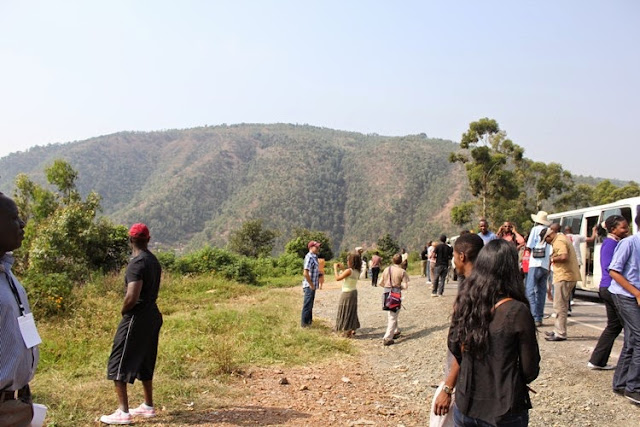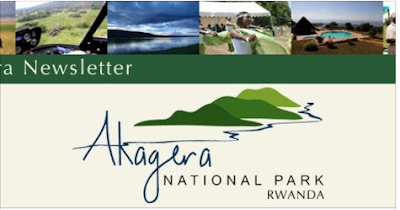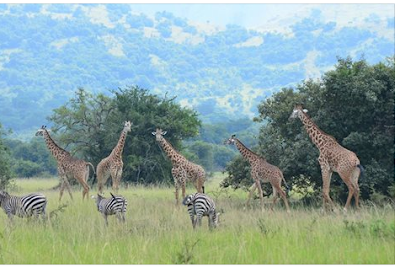Akagera National Park covers 1,200 km² is located in the north east of
Rwanda along the border with Tanzania. It was founded in 1934 to protect
animals and vegetation in three Eco-regions:
savannah,
mountain
and
swamp.
The Akagera National Park is located in Northern East of Rwanda
Akagera national
park is one of Africa’s oldest national parks, the
park is named for the Kagera River that flows along its Eastern
boundary and feeds into labyrinths of lakes of which the largest is Lake Ihema.
The complex system of lakes and
linking papyrus swamps makes up over 1/3 of the park and is the largest
protected wetland in central Africa. The rolling hills of Acacia and
Brachystegia Woodland coupled with scattered grassland and swamps-fronged lakes
along the meandering Akagera watercourse combine to create a park of
breathtaking scenic beauty landscape in Africa. For a fairly small national
park, an Akagera safari can be extremely diverse with a variety of habitats,
wildlife and birds, and some lovely scenery.
The Rwandan government reduced in size from over 2,500 km² to its current size for allowing
residents for refugees in 1990s.
Akagera National park in late afternoon, photo from instagram
Over the next 5 years aUS $ 10 million expenditure is
planned for Akagera including the construction of 120 km western boundary fence
and the reintroduction of lion and black rhino.
Akagera National park is a comfortable 2-3 hour drive
from Kigali, the capital city of Rwanda and can be visited on a long day trip
if you are short of time. However, although game densities are not massively
high, it is an exceptionally pretty park with pleasantly few other visitors, so
it is worth staying a couple of days to explore it.
Akagera Safari camps and lodges
At present, Akagera
National Park has two accommodation options from the camp, there is Ruzizi
Tented Lodge opened in 2013 and is close to the main gate Kiyonza gate in the
south, close to the park Headquarter and is managed by African parks, it is
pretty bush camp on the shores of Lake Ihema. The second is Akagera game lodge.
Other new camps are planned for the northern sector of Akagera in the near
future.
Akagera National park is one of the oldest National parks in Africa established in 1934 in order to protect wild flora and fauna
Activities on Akagera Safari
Akagera
National park’s infrastructures including roads have improved significantly
since African Parks came on board allowing for varied game drives around
plains, hills and lakes. They usually take place in the mornings and afternoons,
or will take a full day if venturing to north, with night drives an option for
spotting Akagera’s nocturnal wildlife.
Boat
trips along the shores of Lake Ihema, the Rwandan’s second largest lake, yield
some great aquatic bird sightings and you can even fish on Lake Shakani.
At Ruzizi lodge in Akagera National park you are able to enjoy the sun rises and sun sets in Akagera
Wildlife of Akagera National park
Akagera
National park’s wildlife has increased significantly over recent years and
latest count estimated that the park is now home to some 8,000 large animals. Plans
are afoot to reintroduce lions and possibly rhinos, making Akagera National
park a big five destination once again. In the meantime, because of the lack of
predators, game is surprisingly releaxed and relatively easy to spot as long as
you don’t expect massive numbers, an Akagera safari won’t disappoint.
The
game on an Akagera safari includes most of the usual plains species. Impala and
Topi (known as tsessebe in Southern Africa) seem to be dominant, with Eland,
Oribi, Masai Giraffe, Defassa Waterbuck, Reedbuck, Bushbuck, Sable and Roan
antelope also present. Burchall’s Zebra, hippo and crocodile are commonly seen
whilst game viewing. Buffalo are more prevalent in the north as are Elephants,
although more restricted.
In Akagera National park Giraffes and Zebras are the most attractive wild animals which you may appreaciate to see
Birds of Akagera National park
Akagera
National park after Nyungwe National park is the most important ornithological
site in Rwanda is especially good for birding, with over 480 species attracted
by its diverse habitat. Morning and evening bird safaris on the game tracks in
Akagera National park provides birdwatchers with opportunity to see selection
of Savannah birds, raptors and several endemic birds’ species such as red-faced
barbet which are often seen. Short boat trips are available on Akagera’ s lakes
which will give you the opportunity to get close to the pleintful waterbirds
including numerous African fish eagles, marabou stork, crowned cranes,
open-billed stork, cormorants, Herons and Egrets.
Some
of common bird’s species on the safari are: the gorgeous lilac-breasted roller,
black headed gonalek, heuglin’s robin-chat, grey hornbill, ross’s turaco,
crested barbet and many more.
Akagera National Park is known to accomodate many species of Birds which is an intersting tourism for birdwatchers lovers
Behind the scenes
For more insight into Akagera, including conservation developments
within the park, take a ‘Behind-the- Scenes’ tour of the park headquarters and
meet some of the people integral to the management of the park. This activity
is open to anyone (with minimum numbers applying) but designed for educational
groups, or special interest travelers.
The tourists like to enjoy the trip along the shore of Lake Ihema which found in Akagera National Park
Entry fees for the park children under the age of 12 are given a
discounted price for entry fees and children under the age of 5 are admitted in
free and also free of activities fee.
Guides are available for hire from the reception and can join visitors on their
self-drives. These guides are on a first come, first serve basis. Booking in
advance is not necessary, unless it is for special groups such as school trips.
The elephants are also one of big five animals seen in Akagera National park and are the most protected wild animals against illegal poaching activities
Maps and guidebooks for self-drives are available at the reception.
Tourists are recommended to spend a full day in Akagera National park to be
able to see the best of the park.
Akagera National park is huge breathtaking and varied national park
with plethora of flora and fauna. Akagera is a beautiful park that comprises
rolling hills, blue lakes, and dense woodland and open grasslands and contains
three of the big five: elephant, Cape buffalo and leopard and many others. In
particular you are able to drive yourself once you are there without a guide,
because the maps are very easy to read and include all the potential turn- offs
that you may encounter.
Different tourists visiting Akagera National Park enjoy watching different wildlife found in that area












Comments
Post a Comment